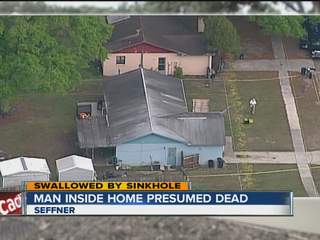
Everyone by now has heard about the sinkhole in nearby Seffner that tragically took a man’s life in the middle of the night. Now reports are popping up of additional sinkholes in the area. Buyers have called me, worried about buying a home in a sinkhole prone area. Fear not – as long as you know a little about how sinkholes work and what insurance you need, you’ll be well educated before your purchase. All reports say that the case in Seffner was an extremely rare case, and that sinkholes usually show signs before such a major collapse as was the case in Seffner recently.
Many companies are only offering Catastrophic ground collapse coverage due to a large number of sinkhole claims over the last few years – many of which may be fraudulent. If an insurer does offer sinkhole coverage, they will require that you get a sinkhole inspection. That can range from $90-$140 I have heard. Catastrophic ground collapse has to be a total loss and the damage has to be visible to the naked eye. The home must be deemed inhabitable before the insurance company pay a claim. Sinkhole coverage, however, covers cracks in the walls, foundation, and more.
Here’s the catch. Getting a sinkhole inspection DOES NOT guarantee coverage. If you’ve followed this real estate blog for long, you may have read my post on how Citizen’s denied my request for a sinkhole policy for my investment property.
There are a few mortgage companies that are requiring clients to get the sinkhole coverage. Be sure to understand the difference between sinkhole coverage and catastrophic ground collapse coverage when you talk to your insurer.
So what IS a sinkhole anyway and why do they happen, you may be wondering? A sinkhole, is a natural depression or hole in the Earth’s surface caused by karst processes – for example – the chemical dissolution of carbonate rocks or suffosion processes in sandstone. Sinkholes may capture surface drainage from running or standing water, but may also form in high and dry places in a certain location. The mechanisms of formation involve natural processes of erosion or gradual removal of slightly soluble bedrock (such as limestone) by percolating water, the collapse of a cave roof, or a lowering of the water table. Here are some common signs of sinkhole activity.
Catastrophic ground cover collapse is defined as “geological activity that results in all of the following: 1). The abrupt collapse of the ground cover; 2). A depression in the ground cover clearly visible to the naked eye; 3). Structural damage to the building including the foundation; and 4). The insured structure being condemned and ordered to be vacated by the government agency authorized by law to issue such an order for that structure.”
If You Have a Sinkhole Claim
Here are some immediate steps you should take if a sinkhole has appeared on your property, or if a portion of your home has shifted or sunk due to ground cover collapse:
• Provide for the personal safety of your family. Evacuate, if necessary.
• Secure or remove your valuable possessions, if you can do so safely.
• Notify your insurance company or agent.
• Notify your city or county building inspection department.
• Mark the sinkhole or property with fencing, rope or tape to warn others of the danger. You could be held liable if someone is injured in the sinkhole.
Other Information To Keep In Mind
• If you have sinkhole coverage, your insurance company will probably order a geological report that will establish the cause of the damage. This report may suggest how to prevent future damage. If the testing confirms that a sinkhole was the cause, your insurance policy should pay for the testing and repairs, less any applicable deductibles.
• Underground materials, such as organic matter and clay, can cause damage that appears to be sinkhole related. Under certain circumstances, you might be held liable for a portion of the cost of repairs if confirmatory testing proves that the damage was not caused by a sinkhole. By law, you are entitled to take part in a neutral evaluator program if you and your insurance company disagree on whether damage was caused by a sinkhole. You can visit www.MyFloridaCFO.com and download the Request for Neutral Evaluator form, or call toll free at 1-877-MY-FL-CFO (1-877-693-5236) to have one mailed to you.
Here’s a link to research sinkhole activity in Florida.
Image via ABCActionNews.com


Leave a Reply